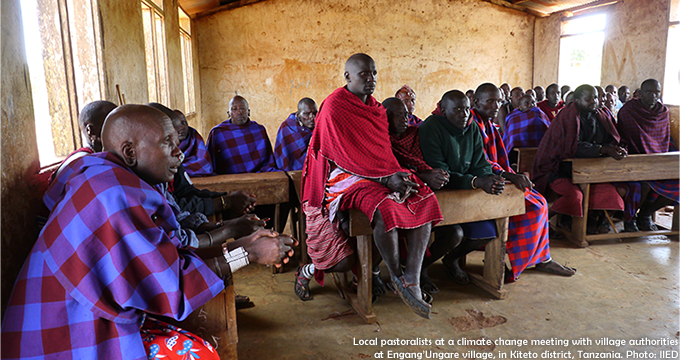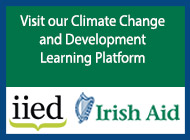Climate Action: Pastoralists and the fight against climate change in Tanzania
2/12/15Pastoralists are nomadic livestock herders who live in the arid regions of Tanzania. Their livelihoods are under threat, with less land available for their herds due to population growth. Climate change effects such as drought have also reduced pasture quality.

Earlier this year, Irish Aid commissioned a case study of three aid programmes* to find which approaches work best to increase their resilience to climate change.
Pastoralists depend on access to resources such as good pastures and water sources to maintain healthy livestock. In arid areas where rainfall is unpredictable, freedom of mobility is key.
Marking out grazing areas and access routes has reduced land use conflict
At present, three overlapping factors are reducing the area and access to available land:
- Rapid population growth;
- Local government support for settled agriculture; and
- Failure by local authorities and pastoralists to effectively manage land.
Blocked livestock routes and access problems to traditional pastures have led to land conflict disputes. The effects of climate change exacerbate these issues and threaten the pastoralists’ way of life.
The Irish Aid-commissioned study found that:
- Communication between the pastoralists and the local authorities is key - through dialogue, pastoralists were able to voice their concerns and appropriate action was then taken to mark out grazing and cultivation areas which reduced land use conflict.
- Misunderstandings about pastoralism are major challenges to effective climate risk management in pastoralist areas. Many district and national government planners continue to assume that pastoralism is unsustainable in the long-term.
- Training on climate change tends to encourage enactment of by-laws to prevent environmental degradation, as participants also seek ways to diversify income activities such as vegetables, seed gardens or bee keeping.
- Rapid and necessary local level changes can be made through the village assembly, most notably on women’s rights of ownership of assets. Women’s empowerment was further enhanced when gender training was explicitly linked to individual land rights, entrepreneurship and representation.
- Gender training has also empowered women to claim land from their clans to generate their own income and to contest for leadership positions. This has benefitted widows and divorcees in particular.
- Much of the community level work has encouraged communities to act independently. Moves to mark out land, enact by-laws to reduce deforestation, support women’s rights and diversify income streams have all emerged independently as a result of new knowledge about climate change.
Future work will now seek to integrate the concerns of all stakeholders in the decision making process about land planning in Tanzania so that pastoralists and settlers alike can adapt best to adverse climate change impacts.
Read more:
Irish Aid commissioned case studies of three aid programmes to find the best approach for resilience to climate change:
* A programme to establish a “devolved level climate finance mechanism” funded by UK-DFID and implemented by the International Institute for Environment and Development (IIED). The project is focused on capacity building and institutional strengthening of district governments in Longido, Monduli and Ngorongoro to develop knowledge of climate change in dryland ecologies and to enhance development planning.
* A “Pastoralist Programme”, funded by Irish Aid and implemented by Care International and the Tanzania Natural Resource Forum (TNRF). The programme provides capacity building and funding for community-based organisations (CBOs) on securing resource access through improved local land management, gender rights and climate change awareness training. It also supports civil society organisations to advocate for “pro-pastoralist” policy at the level of national government.
* A Pastoralism programme that focussing on community support, national and international level advocacy. The programme is managed by Oxfam Tanzania and implemented by national CSOs in Tanzania. The programme funds pastoralist CBOs to support planning for disaster risk reduction and efforts to secure equitable rangeland governance and management. Funding was also provided for pro-pastoralist advocacy.
* Read more about pastoralism and policy training in Tanzania
* Learn more about our work in Tanzania, our Country Climate Action Report for Tanzania, and the work of Irish Aid in combatting climate change.
* Visit the Irish Aid Climate and Development Learning Platform for in-depth information on designing and implementing country-driven, results-orientated and sustainable learning to address climate change. This platform is a collaborative initiative involving Irish Aid, the International Institute for Environment and Development, Irish Aid key partner countries and Irish Aid Partner Organisations.
* This article is part of a Climate Action series focussing on the work of Irish Aid to help poor communities tackle the effects of climate change, published as the UN Climate Conference takes place in Paris.


